- Home
- Fay Weldon
Mischief
Mischief Read online
Start Reading
About this Book
About the Author
Reviews
The Love & Inheritance Trilogy
Also by this Author
Table of Contents
www.headofzeus.com
Contents
Cover
Welcome Page
Introduction
1970s
Angel All Innocence
Alopecia
The Man with No Eyes
Breakages
Weekend
1980s
Delights of France or Horrors of the Road
Down the Clinical Disco
A Gentle Tonic Effect
Chew You Up and Spit You Out
Ind Aff or Out of Love in Sarajevo
Baked Alaska
GUP or Falling in Love in Helsinki
1990s
Love Amongst the Artists
Lily Bart’s Hat Shop
Knock-Knock
Wasted Lives
2000s
A Knife for Cutting Mangoes
Smoking Chimneys
Happy Yuletide Schiphol
Why Did She Do That?
Christmas on Møn
The Ted Dreams – a novella
Preview
Original Publication Details
About this Book
Reviews
About the Author
The Love & Inheritance Trilogy
Also by this Author
An Invitation from the Publisher
Copyright
Introduction
During the four decades over which these stories were written the relationship between men and women in the West has changed out of all recognition. In the seventies women still endured the domestic tyranny of men, in the eighties we found our self-esteem, in the nineties we lifted our heads and looked about, and in the noughties – well, we went out to work. We had to.
The stories from the seventies, I notice, tend to be long and serious, those from the busy two thousands, shorter. Everyone’s busy. By the 2014 novella, various chickens from these last decades have come home to roost, while social media and big pharma wreak their own special havoc. Some things don’t change, of course. Like mother-love; and children learning to put up with second best. The wife may become the partner, but she goes on making, mending, patching broken lives the same as ever.
Reading through my hundred-odd stories was a disturbing experience. Delving into one’s past writing is like delving into memories of one’s own life for an autobiography – there is so much concentrated, even painful experience here. Fiction these stories may be, but the feeling-tones of yesterdays are bound to come surging back. Women’s bodies go on betraying them, desire goes on trumping common sense. The sadistic male artist seems perennial, his poor masochistic moll up to her arms in soapsuds, admiring him.
Most of the tales in this book have been collected before; a few have appeared only in newspapers, magazines or on the radio. A couple are unpublished: the novella had an initial outing as an e-book but is paper published here for the first time. Most of them were written as interruptions of whatever novel I was writing at the time (Alopecia, for example, must have been a kind of interjection into the comparative frivolity of Little Sisters). It seems wiser to get new ideas out of my head and onto the page than keep them seething away inside it. These stories often read, I can see, more like concentrated mini novels than classic short stories.
It was only when I wrote my first short stories unasked for and uncommissioned that I could persuade myself that I was any kind of proper writer. Since I began writing fiction in 1966 I’d found myself writing non-stop in response to requests for television and radio dramas, stage plays, novels, fulfilling contracts and meeting deadlines. But perhaps the fact that I could do that was more to do with my training in advertising than from any genuine talent? Perhaps all I’d been doing was responding to requests in order to pay the rent and keep a family? Not initiating my own ideas like a proper writer? I trusted the incomparable Giles Gordon, my literary agent from 1966 until he died in 2003, to market what I produced. Which he unfailingly did. So I gained confidence.
Then the short began to creep surreptitiously into the long fiction. In Leader of the Band (1988) I added three only obliquely relevant short stories. And fiction crept into ‘non-fiction’: in Letters to Alice on First Reading Jane Austen (1984) I had to warn readers the ‘I’ in the book was not me, albeit she bore my name. In Mantrapped (2004) I stirred fiction into autobiography to work out whether one can truly separate the writer’s personal life from what she makes up. I decided that you couldn’t.
But I have always had a try-try-try-again approach to writing: nothing ends up quite as you meant it to, which is why one sighs and starts again, in the hope that this time you will get it right. Of course you never will. But this way you get an awful lot of different kinds of books written – to the despair of one marketing executive who shook her finger at me at a meeting and said, ‘You write consistent product, we’ll sell it.’
So many changes have come to pass in the last four decades to disturb the equanimity of the writer. By the nineties most of us were writing with computers – it was so fast, so easy, and the mouse outran the brain. Unconsidered first, not second, thoughts reached the page. Writing by hand went out of fashion. I held out until about 1995. I am not at all sure that the change to the digital text has been a blessing. The computer depends for its very existence on disambiguity; it deals with yes-no certainties. ‘Perhaps’ doesn’t get a look in. Every sentence means what it says and only what it says, and the ease of change for the writer is so swift and unlaborious that any hint of paradox, any sense of the opaque, is removed.
And then the e-book came along, the naked text without the frills of publisher’s advocacy, jacket, blurb, writer’s photo: Look at me! Read this book! The text must now stand alone, without defences. Readers, who once liked to settle down with a good book when they had peace and time to think now increasingly read e-books when they are on the move. It’s no surprise that plot-rich, contemplation-light genre novels leave literary novels lagging behind. ‘Good’ writing is so much to do with an aesthetic, with a resonance of language which is more apparent on paper than on a screen.
The Other Side always seems to hover over my work – alternative realities always threatening to break through, scaring us out of our wits and sometimes into them. In The Ted Dreams it finally steps into ours.
Fay Weldon
December 2014
Angel, All Innocence
There is a certain kind of unhappiness, experienced by a certain kind of woman married to a certain kind of man, which is timeless: outrunning centuries, interweaving generations, perpetuating itself from mother to daughter, feeding off the wet eyes of the puzzled girl, gaining fresh strength from the dry eyes of the old woman she will become – who, looking back on her past, remembers nothing of love except tears and the pain in the heart which must be endured, in silence, in case the heart stops altogether.
Better for it to stop, now.
Angel, waking in the night, hears sharp footsteps in the empty attic above and wants to wake Edward. She moves her hand to do so, but then stills it for fear of making him angry. Easier to endure in the night the nightmare terror of ghosts than the daylong silence of Edward’s anger.
The footsteps, little and sharp, run from a point above the double bed in which Angel and Edward lie, she awake, he sleeping, to a point somewhere above the chest of drawers by the door; they pause briefly, then run back again, tap-tap, clickety-click. There comes another pause and the sound of pulling and shuffling across the floor; and then the sequence repeats itself, once, twice. Silence. The proper unbroken silence of the night.
Too real, too clear, for ghosts. The universe is not magic. Everything has an explanation. Rain, perhaps? Hardly. Angel can see the moon shine through the drawn blind, and rain does not fall on moonlit nights. Perhaps, then, the rain of past days collected in some blocked gutter, to finally splash through on to the rolls of wallpaper and pots of paint on the attic floor, sounding like footsteps through some trick of domestic acoustics. Surely! Angel and Edward have not been living in the house for long. The attic is still unpainted, and old plaster drops from disintegrating laths. Edward will get round to it sooner or later. He prides himself on his craftsman’s skills, and Angel, a year married, has learned to wait and admire, subduing impatience in herself. Edward is a painter – of pictures, not houses – and not long out of art school, where he won many prizes. Angel is the lucky girl he has loved and married. Angel’s father paid for the remote country house, where now they live in solitude and where Edward can develop his talents, undisturbed by the ugliness of the city, with Angel, his inspiration, at his side. Edward, as it happened, consented to the gift unwillingly, and for Angel’s sake rather than his own. Angel’s father Terry writes thrillers and settled a large sum upon his daughter in her childhood, thus avoiding death duties and the anticipated gift tax. Angel kept the fact hidden from Edward until after they were married. He’d thought her an ordinary girl about Chelsea, sometime secretary, sometime barmaid, sometime artist’s model.
Angel, between jobs, did indeed take work as an artist’s model. That was how Edward first clapped eyes upon her; Angel, all innocence, sitting nude upon her plinth, fair curly hair glinting under strong lights, large eyes closed beneath stretched blue-veined lids, strong breasts pointed upwards, stubby pale brush irritatingly and coyly hidden behind an angle of thigh that both gave Angel cramps and spoiled the pose for the students. So they said.
‘If you’re going to be an exhibitionist,’ as Edward complained to her later in the coffee bar, ‘at least don’t be coy about it.’ He took her home to his pad, that handsome, dark-eyed, smiling young man, and wooed her with a nostalgic Sinatra record left behind by its previous occupant; half mocking, half sincere, he sang love words into her pearly ear, his warm breath therein stirring her imagination, and the gentle occasional nip of his strong teeth in its flesh promising passion and pain beyond belief. Angel would not take off her clothes for him: he became angry and sent her home in a taxi without her fare. She borrowed from her flatmate at the other end. She cried all night, and the next day, sitting naked on her plinth, had such swollen eyelids as to set a student or two scratching away to amend the previous day’s work. But she lowered her thigh, as a gesture of submission, and felt a change in the studio ambience from chilly spite to warm approval, and she knew Edward had forgiven her. Though she offered herself to multitudes, Edward had forgiven her.
‘I don’t mind you being an exhibitionist,’ Edward said to her in the coffee bar, ‘in fact that rather turns me on, but I do mind you being coy. You have a lot to learn, Angel.’ By that time Angel’s senses were so aroused, her limbs so languid with desire, her mind so besotted with his image, that she would have done whatever Edward wished, in public or in private. But he rose and left the coffee bar, leaving her to pay the bill.
Angel cried a little, and was comforted by and went home with Edward’s friend Tom, and even went to bed with him, which made her feel temporarily better, but which she was to regret for ever.
‘I don’t mind you being a whore,’ Edward said before the next studio session, ‘but can’t you leave my friends alone?’
It was a whole seven days of erotic torment for Angel before Edward finally spent the night with her: by that time her thighs hung loosely open in the studio. Let anyone see. Anyone. She did not care. The job was coming to an end anyway. Her new one as secretary in a solicitor’s office began on the following Monday. In the nick of time, just as she began to think that life and love were over, Edward brought her back to their remembrance. ‘I love you,’ he murmured in Angel’s ear. ‘Exhibitionist slut, typist, I don’t care. I still love you.’
Tap-tap, go the footsteps above, starting off again: clickety-click. Realer than real. No, water never sounded like that. What then? Rats? No. Rats scutter and scamper and scrape. There were rats in the barn in which Angel and Edward spent a camping holiday together. Their tent had blown away: they’d been forced to take refuge in the barn. All four of them. Edward, Angel, Tom and his new girlfriend Ray. Angel missed Edward one night after they all stumbled back from the pub to the barn, and searching for him in the long grass beneath an oak tree, found him in tight embrace with Ray.
‘Don’t tell me you’re hysterical as well as everything else,’ complained Edward. ‘You’re certainly irrational. You went to bed with Tom, after all.’
‘But that was before.’
Ah, before, so much before. Before the declarations of love, the abandoning of all defence, all prudence, the surrendering of common sense to faith, the parcelling up and handing over of the soul into apparent safe-keeping. And if the receiving hands part, the trusted fingers lose their grip, by accident or by design, why then, one’s better dead.
Edward tossed his Angel’s soul into the air and caught it with his casual hands.
‘But if it makes you jealous,’ he said, ‘why I won’t… Do you want to marry me? Is that it? Would it make you happier?’
What would it look like when they came to write his biography? Edward Holst, the famous painter, married at the age of twenty-four – to what? Artist’s model, barmaid, secretary, crime-writer’s daughter? Or exhibitionist, whore, hysteric? Take your choice. Whatever makes the reader happiest, explains the artist in the simplest terms, makes the most successful version of a life. Crude strokes and all.
‘Edward likes to keep his options open,’ said Tom, but would not explain his remark any further. He and Ray were witnesses at the secular wedding ceremony. Angel thought she saw Edward nip Ray’s ear as they all formally kissed afterwards, then thought she must have imagined it.
This was his overture of love: turning to Angel in the dark warmth of the marriage bed, Edward’s teeth would seek her ear and nibble the tender flesh, while his hand travelled down to open her thighs. Angel never initiated their lovemaking. No. Angel waited, patiently. She had tried once or twice, in the early days, letting her hand roam over his sleeping body, but Edward not only failed to respond, but was thereafter cold to her for days on end, sleeping carefully on his side of the bed, until her penance was paid and he lay warm against her again.
Edward’s love made flowers bloom, made the house rich and warm, made water taste like wine. Edward, happy, surrounded Angel with smiles and soft encouragement. He held her soul with steady hands. Edward’s anger came unexpectedly, out of nowhere, or nowhere that Angel could see. Yesterday’s permitted remark, forgiven fault, was today’s outrage. To remark on the weather to break an uneasy silence, might be seen as evidence of a complaining nature: to be reduced to tears by his first unexpected biting remark, further fuel for his grievance.
Edward, in such moods, would go to his studio and lock the door, and though Angel (soon learning that to weep outside the door or beat against it, moaning and crying and protesting, would merely prolong his anger and her torment) would go out to the garden and weed or dig or plant as if nothing were happening, would feel Edward’s anger seeping out from under the door, darkening the sun, poisoning the earth; or at any rate spoiling her fingers in relation to the earth, so that they trembled and made mistakes and nothing grew.
The blind shakes. The moon goes behind a cloud. Tap, tap, overhead. Back and forth. The wind? No. Don’t delude yourself. Nothing of this world. A ghost. A haunting. A woman. A small, desperate, busy woman, here and not here, back and forth, out of her time, back from the grave, ill-omened, bringing grief and ruin: a message that nothing is what it seems, that God is dead and the forces of evil abroad and unstoppable. Does Angel hear, or not hear?
Angel through her fear, wants to go to the bat
hroom. She is three months pregnant. Her bladder is weak. It wakes her in the night, crying out its need, and Angel, obeying, will slip cautiously out of bed, trying not to wake Edward. Edward needs unbroken sleep if he is to paint well the next day. Edward, even at the best of times, suspects that Angel tossing and turning, and moaning in her sleep, as she will, wakes him on purpose to annoy.
Angel has not yet told Edward that she is pregnant. She keeps putting it off. She has no real reason to believe he does not want babies: but he has not said he does want them, and to assume that Edward wants what other people want is dangerous.
Angel moans aloud: afraid to move, afraid not to move, afraid to hear, afraid not to hear. So the child Angel lay awake in her little white bed, listening to her mother moaning, afraid to move, afraid not to move, to hear or not to hear. Angel’s mother was a shoe-shop girl who married the new assistant manager after a six-week courtship. That her husband went on to make a fortune, writing thrillers that sold by the million, was both Dora’s good fortune and tragedy. She lived comfortably enough on alimony, after all, in a way she could never have expected, until dying by mistake from an overdose of sleeping pills. After that Angel was brought up by a succession of her father’s mistresses and au-pairs. Her father Terry liked Edward, that was something, or at any rate he had been relieved at his appearance on the scene. He had feared an element of caution in Angel’s soul: that she might end up married to a solicitor or stockbroker. And artists were at least creative, and an artist such as Edward Holst might well end up rich and famous. Terry had six Holst canvases on his walls to hasten the process. Two were of his daughter, nude, thigh slackly falling away from her stubby fair bush. Angel, defeated – as her mother had been defeated. ‘I love you, Dora, but you must understand. I am not in love with you.’ As I’m in love with Helen, Audrey, Rita, whoever it was: off to meetings, parties, off on his literary travels, looking for fresh copy and new backgrounds, encountering always someone more exciting, more interesting, than an ageing ex shoe-shop assistant. Why couldn’t Dora understand? Unreasonable of her to suffer, clutching the wretched Angel to her alarmingly slack bosom. Could he, Terry, really be the only animation of her flesh? There was a sickness in her love, clearly; unaccompanied as it was by the beauty which lends grace to importunity.

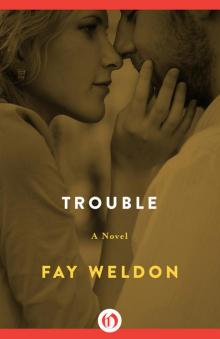 Trouble
Trouble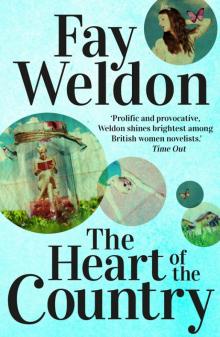 The Heart of the Country
The Heart of the Country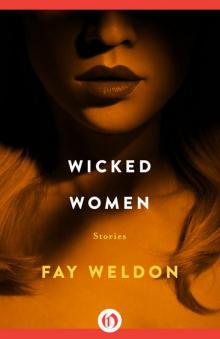 Wicked Women
Wicked Women Mischief
Mischief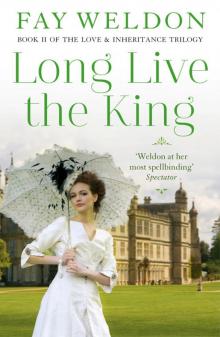 Long Live the King
Long Live the King Remember Me
Remember Me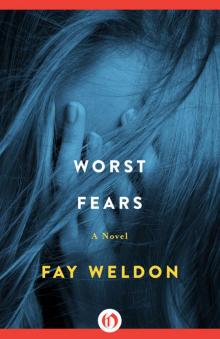 Worst Fears
Worst Fears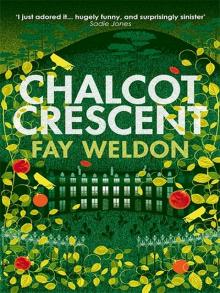 Chalcot Crescent
Chalcot Crescent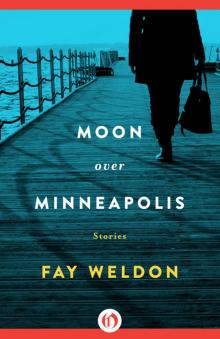 Moon Over Minneapolis
Moon Over Minneapolis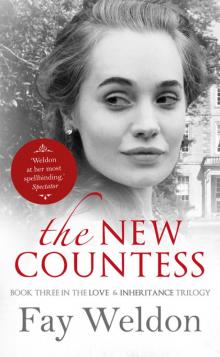 The New Countess
The New Countess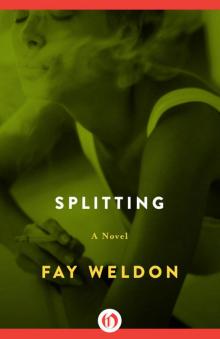 Splitting
Splitting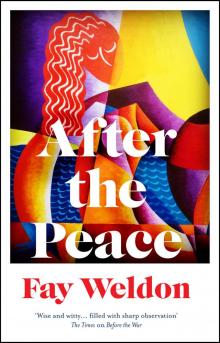 After the Peace
After the Peace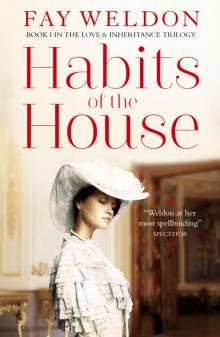 Habits of the House
Habits of the House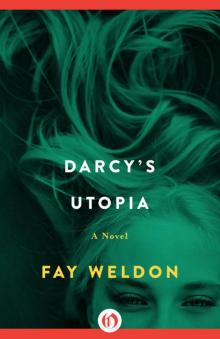 Darcy's Utopia
Darcy's Utopia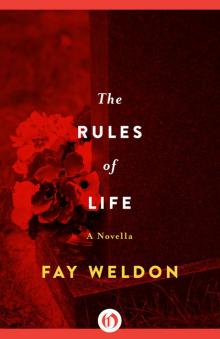 The Rules of Life
The Rules of Life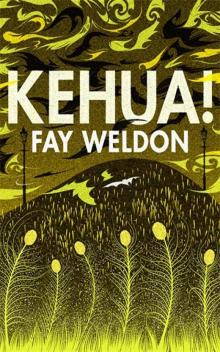 Kehua!
Kehua!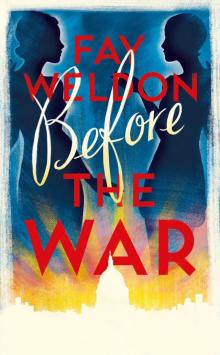 Before the War
Before the War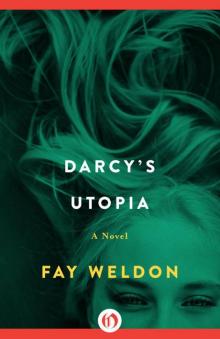 Darcy's Utopia: A Novel
Darcy's Utopia: A Novel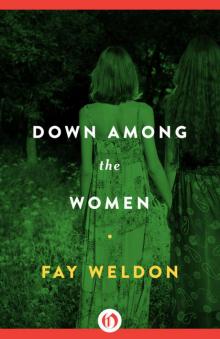 Down Among the Women
Down Among the Women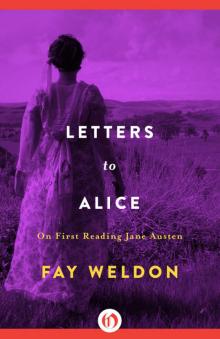 Letters to Alice
Letters to Alice 3 Great Historical Novels
3 Great Historical Novels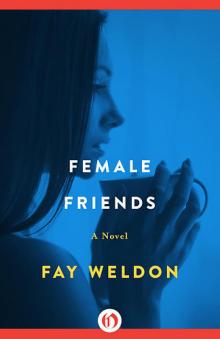 Female Friends
Female Friends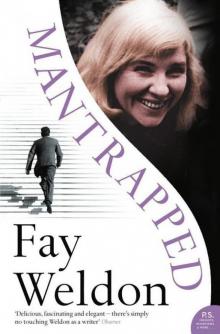 Mantrapped
Mantrapped The Bulgari Connection
The Bulgari Connection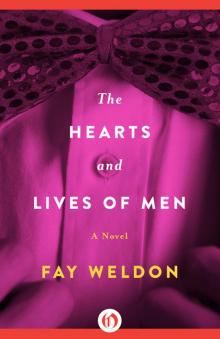 The Hearts and Lives of Men
The Hearts and Lives of Men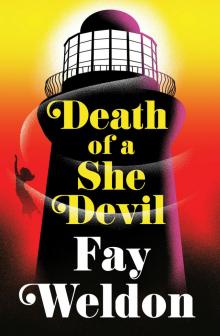 Death of a She Devil
Death of a She Devil